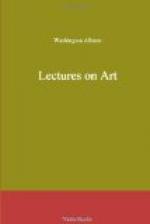We shall now endeavour to establish the following proposition: namely, that the Pleasures in question have their true source in One Intuitive Universal Principle or living Power, and that the three Ideas of Beauty, Truth, and Holiness, which we assume to represent the perfect in the physical, intellectual, and moral worlds, are but the several realized phases of this sovereign principle, which we shall call Harmony.
Our first step, then, is to possess ourself of the essential or distinctive characteristic of these pleasurable emotions. Apparently, there is nothing more simple. And yet we are acquainted with no single term that shall fully express it. But what every one has more or less felt may certainly be made intelligible in a more extended form, and, we should think, by any one in the slightest degree competent to self-examination. Let a person, then, be appealed to; and let him put the question as to what passes within him when possessed by these emotions; and the spontaneous feeling will answer for us, that what we call self has no part in them. Nay, we further assert, that, when singly felt, that is, when unallied to other emotions as modifying forces, they are wholly unmixed with any personal considerations, or any conscious advantage to the individual.
Nor is this assigning too high a character to the feelings in question because awakened in so many instances by the purely physical; since their true origin may clearly be traced to a common source with those profounder emotions which we are wont to ascribe to the intellectual and moral. Besides, it should be borne in mind, that no physical object can be otherwise to the mind than a mere occasion; its inward product, or mental effect, being from another Power. The proper view therefore is, not that such alliance can ever degrade the higher agent, but that its more humble and material assimilant is thus elevated by it. So that nothing in nature should be counted mean, which can thus be exalted; but rather be honored, since no object can become so assimilated except by its predetermined correlation to our better nature.
Neither is it the privilege of the exclusive few, the refined and cultivated, to feel them deeply. If we look beyond ourselves, even to the promiscuous multitude, the instance will be rare, if existing at all, where some transient touch of these purer feelings has not raised the individual to, at least, a momentary exemption from the common thraldom of self. And we greatly err if their universality is not solely limited by those “shades of the prison-house,” which, in the words of the poet, too often “close upon the growing boy.” Nay, so far as we have observed, we cannot admit it as a question whether any person through a whole life has always been wholly insensible,—we will not say (though well we might) to the good and true,—but to beauty; at least, to some one kind, or degree, of the




